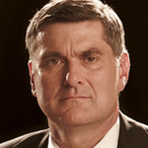Specialty
Craig Thompson
Cancer Research
The Thompson laboratory has proposed that the basis of human cell survival is determined by the inability of cells to take up nutrients in a cell-autonomous fashion. We believe the lack of a cell intrinsic mechanism to regulate nutrient uptake provides the first and most fundamental barrier to cell transformation.
Self Exam
- Occupation: President, MSKCC; Physician/Scientist
- Alternative career choice: High School Teacher
- What do rock stars and scienctists have in common: Creativity
- Musical Instrument I Play: Ukulele
- I tend to approach life: Positively
- Biggest misconceptions about me or my work: That we don't have fun.
- Worst part-time job ever: Baseball umpire
- Longest med school study session: Medical Board Part 1
- Best moment in medicine/research: Meeting my wife
About My Research
Disease Area: Leukemia
Research Area: Cancer Metabolism, Immunology
Science Impact/Accomplishments or Goal: Cancer is now the number one killer worldwide. We focus on understanding how cancer cells steal nutrients from other cells in order to grow.
Research Description: A cell is defined by what it eats.
Biography
Craig B. Thompson, MD, MSKCC President & CEO, Member, Geoffrey Beene Cancer Research Center Executive Committee
Craig Thompson became President and Chief Executive Officer of Memorial Sloan-Kettering Cancer Center — the world’s oldest and largest private institution devoted to cancer prevention, treatment, research, and education — in November 2010.
For the previous eleven years, Dr. Thompson had been affiliated with The University of Pennsylvania. He joined them in 1999 as a professor of medicine, scientific director of The Leonard and Madlyn Abramson Family cancer Research Institute, and the first chairman of the Department of Cancer Biology. In 2006 he was named Director of the Abramson Cancer Center of the University of Pennsylvania and Associate Vice President for Cancer Services of the University of Pennsylvania Health System.
Dr. Thompson received his bachelor’s degree from Dartmouth College and went on to earn an MD degree in 1977 from the University of Pennsylvania Medical School. He received clinical training in internal medicine at Harvard Medical School and in medical oncology at the Fred Hutchinson Cancer Research Institute at the University of Washington. After completing his training, Dr. Thompson became a physician at the National Naval Medical Center in Bethesda, Maryland, and an assistant professor of medicine at the Uniformed Services University of the Health Sciences. In 19ti7, he joined the faculty of the University of Michigan as an assistant professor of medicine and an assistant investigator in the Howard Hughes Medical Institute (HHMI). From 1993 until he joined the University of Pennsylvania, he was affiliated with the University of Chicago, where he was professor of medicine, an HHMI investigator, and Director of the Gwen Knapp Center for Lupus and Immunology Research.
Dr. Thompson currently serves as member of the Medical Advisory Board of the Howard Hughes Medical Institute, a member of the Board of Directors of the American Association for Cancer Research, a member of the Lasker Prize Jury, and Associate Editor of Cell, Immunity, and Cancer Cell. In the past, Dr. Thompson has served as the Chairman of the Scientific Advisory Board of the Damon Runyon/Walter Winchell Cancer Foundation, Chairman of the Board of Scientific Counselors of the National Cancer Institute, and a member of the Experimental Immunology Study Section of the National Institutes of Health. Dr. Thompson is the holder of a number of patents related to immunotherapy and apoptosis, and is a founder of three biotechnology companies. He is an elected member of the National Academy of Sciences, the Institute of Medicine, the American Academy of Arts and Sciences, the American Society for Clinical Investigation, and the American Association of Physicians.
To date, Dr. Thompson has published more than 350 peer-reviewed manuscripts and more than ti5 reviews. Currently, his laboratory undertakes basic research in the fields of cancer biology and immunology. The laboratory has recently contributed to the resurgent interest in cancer cell metabolism and is developing translational therapies to exploit the metabolic addictions exhibited by cancer cells.
